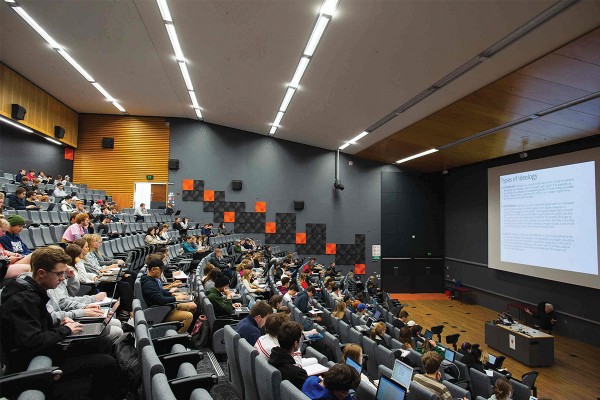In a win for accessibility and people who swear they can’t hear without subtitles, closed-captions in lectures appear to be getting closer to reality for Otago tauira. Last week, all students were emailed a link for surveys inviting them to give feedback on a policy proposed by the OUSA Exec that would mandate lecture recordings.
OUSA Exec members Tara, Ibuki, and Stella L have been working all year to see the policy get over the line. In a soft launch for feedback, they included the question in the first semester referendum: ‘Should OUSA advocate for a new policy that will give students universal access to closed-captioned lecture recordings?’ It passed with 82.3% approval. Despite the referendum question’s success, further feedback through official university channels is needed for the policy to be actualised.
Numerous staff have reportedly taken issue with the proposed changes in their round of feedback, setting the stage for students to respond in their droves. The University’s feedback form has been open for six hours at the time of writing, yet feedback has already been rolling in hot, with around 120 responses in mere hours. Nothing like a good turf war via survey.
Most feedback thus far has supported the policy with multiple hearing-impaired, neurodiverse, and dyslexic students ardently supporting the change. The large majority argue that it will make their lectures easier to understand and engage with. One commenter said, “Audio on lecture recordings is always so fucked, hard to understand if your first language isn't English!”
Some concerns were raised by students, however, with one student mentioning that if AI creates the transcripts it “won't account for complex scientific language or non-English, especially te reo Māori.” Another student said, “It may be impractical for certain smaller papers or papers with a non-standard lecture format to implement such a policy, so some level of flexibility would need to be considered.”
Writing for Critic’s OUSA Exec column in this week’s issue, OUSA International Rep Ibuki Nishida, said, “The Exec have been working legit all year on this policy and I think it’ll be an absolute game-changer for students. It’ll be helpful for neurodivergence, disability, cost of living (sometimes you need to pick up a shift), language barriers, sickness, safety and even more of that nerdy yet important stuff. We just need 6000 responses and that’ll help us get the policy over the line, and hopefully in place by next year!”
Commenting on the staff pushback, many of whom are worried about attendance and educational outcomes, Ibuki said, “But I think, if anything, if every lecture is recorded it creates an incentive for these professors to work harder and make their lectures more interesting/engaging/interactive so that they are worth going to in person.”
Speaking to the changes, Deputy Vice Chancellor Stuart Brock told Critic Te Ārohi, “The University does have a lecture recording policy, however, it was last formally reviewed in 2016. There have been many changes in our context and subsequent teaching and recording practices at the University since this time. As a result, the University is in the early stages of reviewing the policy and has invited OUSA to partner with the Academic Division in the process. I am excited to be working closely with OUSA on this review, ensuring we have a strong student voice throughout the process. Prior to drafting an updated policy, the University will be looking to consult widely, giving all staff and students an opportunity for their input.”
Feedback is open until August the 6th. Critic suggests including mandatory instruction manuals teaching lecturers to make sure recordings are working.



